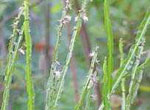|

Raintree Nutrition's Concentrated Carqueja Extract uses new
and proprietary extraction methods to concentrate and preserve the active
ingredients found in this wonderful plant. Concentration and extraction methods
provide the equivalent of 500 mg carqueja leaf and stem (Baccharis
genistelloides) per milliliter of extract. Carqueja is a rich source of
flavonoids. Certain flavonoids, such as silymarin in milk thistle, have shown
liver-protective properties and are used for many liver conditions in herbal
medicine systems.* Carqueja is rather like the South American version of milk
thistle. It contains up to 20% flavonoids, including quercetin, luteolin,
nepetin, apigenin, and hispidulin. The flavonoids are considered carqueja's main
active constituents. Carqueja is a Brazilian plant (cataloged by several
botanical names including Baccharis genistelloides, B. triptera, B.
trinervis, and B. trimera). It has a long history of use as a natural
digestive aid and liver-supporting aid in Brazilian herbal medicine.
Traditional Uses:* for digestive disorders (ulcers,
gastroenteritis, acid reflux, and ileocecal valve disorders) and to slow
digestion; to tone, balance, and strengthen liver function (also to eliminate
liver flukes, increase liver bile and to remove toxins from the liver); for
gallbladder disorders (stones, pain, lack of bile, sluggish action, toxin
build-up); as a detoxifier (blood, liver, gallbladder, pancreas); for viral
infections (stomach viruses, HIV, herpes simplex)
Ingredients: Carqueja whole herb (Baccharis
genistelloides) extracted in distilled water and 40% ethanol.
Suggested Use: Take 60 drops (2 ml) 2 or more times
daily, or as directed by a healthcare professional.
Contraindications:
- Not to be used during pregnancy as carqueja has demonstrated uterine
stimulant and abortive effects in rats.
- The use of this plant is contraindicated in persons with low blood
pressure due to its documented hypotensive effects.
- Carqueja has been documented to lower blood glucose levels in human and
animal studies. As such, it is contraindicated in persons with hypoglycemia.
Diabetics should monitor their blood sugar levels more closely if they use
carqueja.
Drug Interactions: None reported, however, it may increase the effect of
diabetic and antihypertensive drugs.
Other Practitioner Observations:
- Carqueja has demonstrated antihepatotoxic (liver detoxifying) effects in
animal studies. As such, it may speed the clearance of some drugs metabolized
in the liver (decrease the half-life), thereby reducing the pharmacological
effect (and/or side effects) of certain drugs required to be metabolized in
the liver.
Family:Asteraceae
Genus: Baccharis
Species: genistelloides
Synonyms: Baccharis trimera, B. triptera , B. venosa, Conyza
genistelloides, Molina venosa
Common Names: Carqueja, bacanta, bacárida, cacaia-amarga, cacalia
amara, cacália-amarga, cacália-amargosa, cacliadoce, carqueja amara,
carqueja-amargosa, carqueja-do-mato, carquejilla, carquejinha, chinchimani,
chirca melosa, condamina, cuchi-cuchi, quimsa-kuchu, quinsu-cucho,
quina-de-condamiana, tiririca-de-balaio, tres-espigas, vassoura
Parts Used: Entire plant, aerial parts
|
CARQUEJA |
|
HERBAL PROPERTIES AND ACTIONS
|
| Main Actions |
Other Actions |
Standard Dosage |
|
protects liver
|
induces abortions
|
Aerial parts |
|
detoxifies liver
|
kills viruses
|
Infusion: 1/2 cup 2-3 times daily |
|
aids digestion
|
increases urination
|
Tincture: 2-4 ml 2-3 times daily |
|
reduces acid
|
reduces fever
|
Capsules: 2 g twice daily |
|
treats ulcers
|
promotes sweating
|
|
|
relieves pain
|
|
|
|
expels worms
|
|
|
|
mildly laxative
|
|
|
|
reduces inflammation
|
|
|
|
lowers blood sugar
|
|
|
|
cleanses blood
|
|
|
|
tones gastric tract
|
|
|
|
![]()
![]()
![]()
![]()